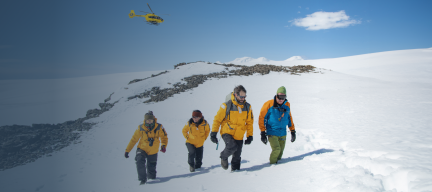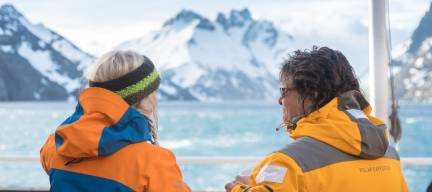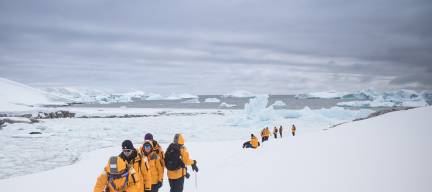Each year, around the world, we spend over a trillion dollars exploring and experiencing destinations other than those in which we live. Americans alone went out into the world and spent $246 billion traveling internationally in 2015.

Why do people travel the world, and what are we looking for?
We want to explore, to have new experiences, to grow. People travel for different reasons but often, the most rewarding travel experiences are those that leave us feeling better than when we began. We want this self-improvement to be long lasting, too; a tan looks great for a few days but fades, while a more positive outlook on life is something you can take back to work and keep with you.
Psychologists have long used the ‘Big 5′ personality traits to describe and explain how our unique, individual personalities work. Beyond that academic value, building our awareness and working on each of the Big 5 is an important exercise in personal development. There’s no better place to practice and develop these exceptional traits than on a polar expedition — here’s why.
Openness to Experience
When we close ourselves off to or shy away from new experiences, we risk missing out on the moments that can truly change us for the better.
Formerly CEO at Quark Expeditions and now with TUI Travel Group, Hans Lagerweij is an avid traveler, as well. Like all polar travelers, he quickly learned that expecting the unexpected can lead to some truly amazing adventures.

“Trying to make our way down to King George Island from Punta Arenas, it was foggy on the day we were supposed to fly, so we were delayed for 8 hours, making it evening when we were finally cleared to fly,” Lagerweij shared in an interview. “So, as it turns out, this was the very first passenger night flight that Quark’s airline partner DAP had ever done in Antarctica, and was thus a new achievement in the history of tourism in Antarctica!”
What would have been a frustration anywhere else in the world — a delayed flight — became a trip-defining experience on a polar expedition, and a moment in history involving those present.
Conscientiousness
Conscientiousness is a great thing to have — in moderation. It’s great to be organized, but too much of it can make you seem rigid and inflexible.
The pristine and incredibly fragile Antarctic and Arctic regions call for a great deal of conscientiousness, and your experienced Expedition Leaders will help you practice this one. We don’t take any food or drink on Antarctica with us, for example, and we leave absolutely nothing behind when we leave. We also take care not to upset the delicate socioeconomic balance in the Arctic communities we visit.

You’ll hear lectures and see presentations about polar conservation on almost every trip, as it’s such an important and pressing issue. As you have the opportunity to visit polar wildlife in its natural environment and witness the hardships each species has endured to survive, it’ll change or perhaps sharpen your perspective on environmental issues.
Being completely immersed in the punishing and yet delicate ecosystems of the extreme North and South will leave you a more conscientious person as a whole.
Extraversion
Extraversion is the trait that makes us outgoing, sociable and fun to be around. It can be challenging to develop, though, because lacking it makes you that much less likely to do what you need to do in order to build it: go out and meet people
Polar expedition travel offers the naturally introverted a few huge benefits in the development of this trait. For starters, the intimate nature of expedition ships and extended period of travel with a smaller group of people makes it more likely you’ll get to know your fellow passengers and find common ground.
But then, you’ll quickly find that you’re surrounded by and completely immersed in common ground. When you’ve spent a day watching massive icebergs calve off a glacier millions of years old and sit down to dinner with the only other people on the planet who’ve had that same experience, you won’t run out of things to talk about!

The ability to interact and engage with onboard experts is sure to jog your extraverted streak, as well. The marine biologists, ornithologists, glaciologists and other professionals who lecture and do research on our expeditions also hike with travelers, take their meals with you in the dining room and participate in the whole expedition experience. Taking that once in a lifetime opportunity to chat with a polar specialist of their calibre will surely instill a confidence boost in your social skills!
Agreeableness
Being agreeable doesn’t mean you have to be a yes-man; rather, it refers to your tendency to be cooperative and compassionate towards others. It’s a trait you’ll use each and every day on board a polar expedition, where you’ll be heading out on polar adventures like Zodiac cruising, hiking, snowshoeing, kayaking or even camping with your fellow passengers.

You’ll meet and travel with people from all kinds of backgrounds, of all ages, with all kinds of differing interests and passions. People from 150 countries travel with us each year so while you’re completely immersed in these remote destinations, you’ll share the experience with new friends, as well.
Neuroticism
You might think neuroticism is an undesirable trait, but like the others, it’s important to have in moderation. You don’t want to be so excitable as to be perceived unstable or insecure, but then you don’t want to be so controlled that nothing excites you anymore, either.
Polar expeditions are a great place to exercise healthy levels of fear and anxiety. If you never feel these things, you probably aren’t pushing your boundaries in any way that could lead to real personal growth. But as you’re given the option to try a new adventure sport, complete a particularly strenuous hike, or address your fear of heights from high atop a ridge overlooking a stunning frozen beach below, you very well might be afraid. You could have some anxiety about it, but you’ll know you’re in good hands, supported by experienced professionals and a whole ship full of people facing down exactly the same fears and anxieties you are.

Far removed from the grind of everyday life, you can really explore your own big 5 personality traits and work on making changes that will stay with you long after your first polar expedition is over (and you’re on to planning the next one!).
Interested in learning more about polar expeditions? Download the new Quark Expeditions 2018.19 Brochure.










